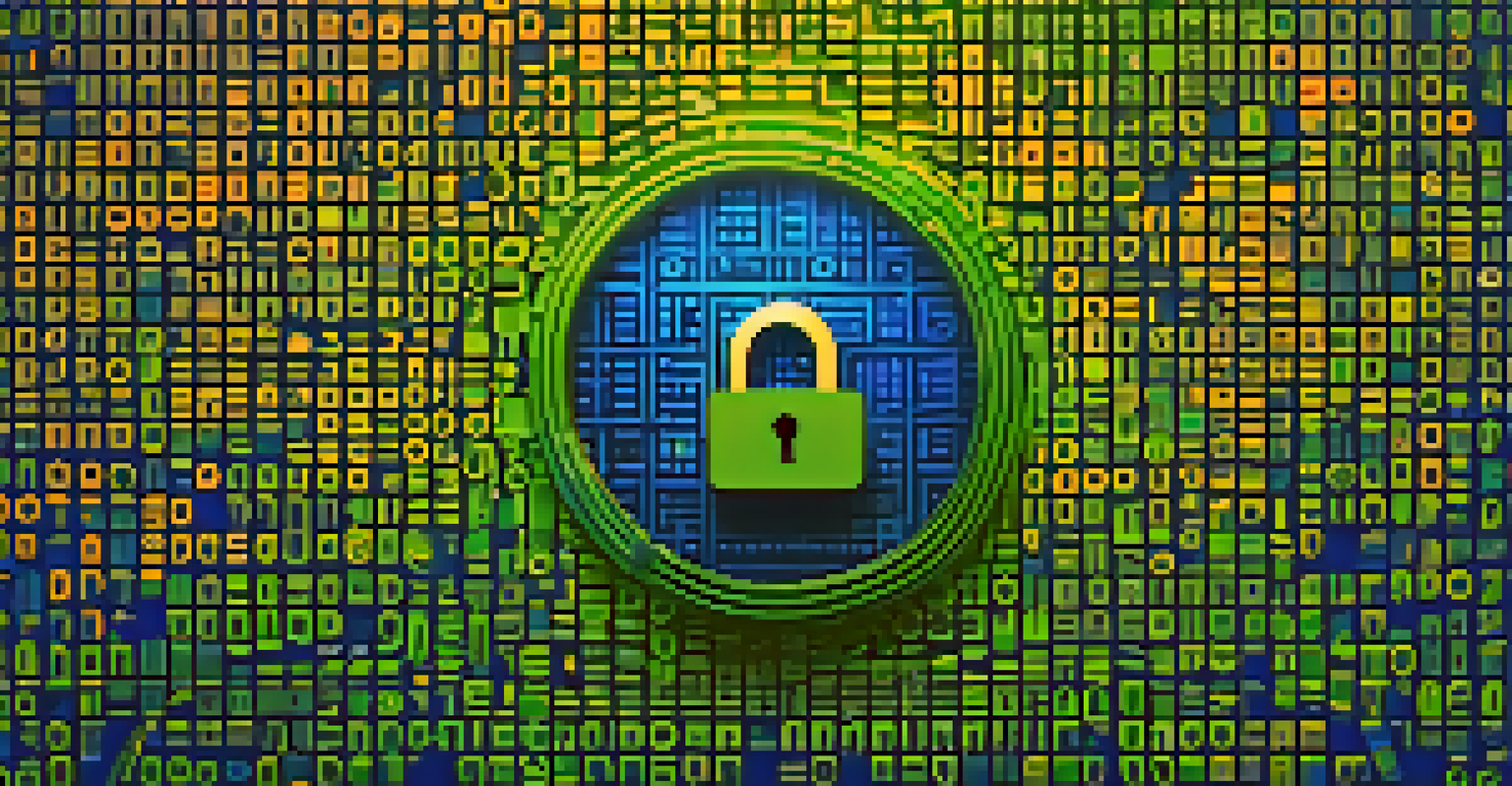The Role of Encryption in Securing Your Bitcoin Wallet

Understanding Bitcoin Wallets and Their Vulnerabilities
Bitcoin wallets serve as digital vaults for storing your cryptocurrency. However, like any vault, they can be vulnerable to attacks if not properly secured. Cybercriminals are constantly on the lookout for weak points in wallet security, making it crucial for users to understand these vulnerabilities.
The greatest risk is not taking one. In a world that's changing really quickly, the only strategy that is guaranteed to fail is not taking risks.
Most wallets are essentially software applications that store your private keys, the necessary credentials for accessing your Bitcoin. If these keys fall into the wrong hands, you could lose all your funds. This makes it imperative to implement effective security measures, including encryption.
Encryption acts as a digital shield, protecting your private keys from unauthorized access. By encrypting your wallet, you add an additional layer of security that can deter potential attackers, making it much harder for them to access your valuable assets.
What Is Encryption and How Does It Work?
At its core, encryption is the process of converting data into a code to prevent unauthorized access. Think of it as a secret language that only you and those you trust can understand. In the context of your Bitcoin wallet, encryption transforms your private keys into a format that is unreadable without the correct decryption key.

When you encrypt your wallet, you're essentially locking it behind a digital door. Only individuals with the right key can unlock and access the information inside. This ensures that even if a hacker gains access to your wallet's data, they won't be able to decipher it without the necessary credentials.
Bitcoin Wallets Need Strong Encryption
Encrypting your Bitcoin wallet is essential to protect your private keys from unauthorized access and potential theft.
There are various encryption methods available, such as AES (Advanced Encryption Standard), which is widely regarded as one of the most secure. By choosing robust encryption protocols, you enhance your wallet's defenses against potential threats, making it more challenging for attackers to compromise your funds.
Benefits of Encrypting Your Bitcoin Wallet
Encrypting your Bitcoin wallet provides several benefits beyond just increased security. Firstly, it allows you to maintain your privacy by protecting sensitive information from prying eyes. This is particularly important in a world where data breaches and identity theft are on the rise.
Security is not a product, but a process.
Additionally, encryption can give you peace of mind. Knowing that your wallet is secured with strong encryption can alleviate concerns about losing your funds to theft or hacking attempts. It empowers you to engage with the cryptocurrency market confidently.
Finally, encryption can also facilitate secure backups. If your wallet is encrypted, you can create backups without compromising your private keys. This means that even if your device is lost or damaged, you can still recover your wallet safely.
Best Practices for Encrypting Your Bitcoin Wallet
To effectively encrypt your Bitcoin wallet, start by choosing a reputable wallet that offers strong encryption features. Look for wallets that provide end-to-end encryption, ensuring that your data remains secure throughout its lifecycle. Researching user reviews and recommendations can help you make an informed choice.
Next, always use a strong, unique password for your wallet encryption. Avoid using easily guessable passwords or common phrases. Instead, opt for a mix of uppercase, lowercase, numbers, and special characters to create a password that is difficult to crack.
Encryption Enhances Privacy and Security
Using encryption not only secures your wallet but also safeguards your sensitive information from prying eyes.
Lastly, remember to keep your encryption keys securely stored. This might mean writing them down and keeping them in a safe place or using a password manager. Losing access to your encryption key can result in permanent loss of your Bitcoin, so it's crucial to prioritize this step.
Common Misconceptions About Bitcoin Wallet Encryption
One common misconception is that simply having an encrypted wallet guarantees protection against all threats. While encryption significantly enhances security, it doesn't make you invincible. Users must also remain vigilant and practice general cybersecurity measures to safeguard their wallets effectively.
Another myth is that encryption slows down wallet performance. In reality, the performance impact of encryption is minimal with modern technology. Most reputable wallets are designed to handle encryption seamlessly, allowing you to access your funds without noticeable delays.
Lastly, some people believe that encryption is only necessary for large amounts of Bitcoin. This is a dangerous mindset, as hackers often target wallets of all sizes. Regardless of how much Bitcoin you own, encryption should be a standard practice to protect your assets.
The Future of Encryption in Cryptocurrency Security
As the cryptocurrency landscape evolves, so too does the technology behind encryption. Innovations in cryptography are emerging, providing even more robust and sophisticated methods for securing digital assets. This means that the future of wallet security is likely to be more advanced and user-friendly.
With the rise of quantum computing, traditional encryption methods may face new challenges. However, researchers are actively developing quantum-resistant algorithms to ensure that encryption remains effective against future threats. Staying informed about these developments will be vital for Bitcoin holders.
Best Practices Ensure Wallet Safety
Choosing a reputable wallet, using strong passwords, and securely storing encryption keys are critical steps to effectively protect your Bitcoin.
Ultimately, as the importance of cryptocurrency continues to grow, so will the emphasis on encryption. Users must adapt to these changes and embrace best practices to protect their digital wealth in an ever-changing environment.
Conclusion: Prioritize Encryption for Your Bitcoin Wallet
In conclusion, encryption plays a critical role in securing your Bitcoin wallet and protecting your assets. By understanding how encryption works and implementing best practices, you can significantly reduce the risk of unauthorized access to your funds. It's not just a technological measure; it's a mindset of vigilance and responsibility.
As the cryptocurrency market grows, so do the threats targeting it. By prioritizing encryption, you can stay ahead of potential hackers and safeguard your investments. Remember, your Bitcoin wallet is a valuable asset, and treating it as such will go a long way in ensuring its security.

So, take action today. Invest the time in understanding encryption and its benefits, and make it a priority in your cryptocurrency journey. Your peace of mind and financial security depend on it.